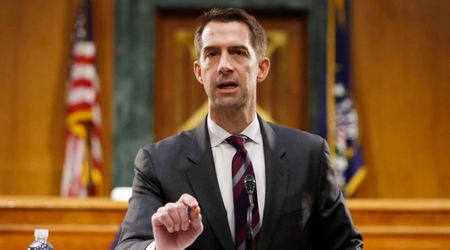Lloyd Austin’s hospitalization: 8 details about Defense Secretary’s health crisis that took White House by surprise

How Defense Secretary Lloyd Austin's hospitalization sparked controversy and calls for accountability

The Pentagon provided additional details on Monday, January 8, regarding the hospitalization of Defense Secretary Lloyd Austin. Questions had arisen about why President Biden, Congress, and the public were unaware of Austin's hospitalization for several days. The White House and Deputy Secretary of Defense Kathleen Hicks only learned about Austin's hospitalization on January 4, when his chief of staff, Kelly Magsamen, who was previously ill with the flu, informed them. Pentagon press secretary Maj Gen Patrick Ryder attributed the delay in communication to Magsamen's illness.
When was Lloyd Austin hospitalized?

On Monday, January 1, Austin was transported by ambulance to the intensive care unit at Walter Reed Medical Center "but then remained in that location, in part, due to hospital space considerations and privacy," as explained by Ryder. A week later, Austin is still hospitalized, though he has been moved out of the ICU and is reported to be recovering effectively. As of Monday evening, there isn't a set release date, but the Pentagon has committed to providing daily updates on Austin's health.
Why was Lloyd Austin hospitalized?

Austin underwent an elective procedure on December 22 while on leave, according to Pentagon spokesman Maj Gen Pat Ryder. The details of the procedure remain undisclosed due to privacy concerns. Following the procedure, Austin returned home the next day and “continued to work from home through the holidays.” Notably, the Pentagon did not inform the White House about Austin's procedure, as confirmed by Ryder in response to a question from CNN. On January 1, Austin experienced "severe pain" and was transported from his residence to Walter Reed by ambulance, where he was admitted to the intensive care unit. Ryder mentioned, "He was conscious but in quite a bit of pain."
Who knew about Lloyd Austin’s hospitalization?

As mentioned, on January 1, Austin encountered "severe pain" and was taken from his residence to Walter Reed via ambulance. Subsequent to undergoing "tests and evaluations" on the evening of January 1 and throughout January 2, he entrusted certain responsibilities to Deputy Secretary of Defense Kathleen Hicks "on the basis of medical advice." On the same day, Austin's chief of staff Kelly Magsamen, senior military assistant Lt Gen Ronald Clark, and Chairman of the Joint Chiefs of Staff Gen CQ Brown were informed of Austin's hospitalization.
30-day review of the Pentagon’s processes and procedures

In a memo issued late on Monday, the Pentagon outlined plans for a 30-day review by the Defense Department. This comprehensive assessment will delve into the timeline of events and notifications since Austin's hospitalization, the protocol for determining the secretary's incapacity to fulfill duties, and recommendations to enhance the notification process for senior leaders. Austin's Chief of Staff, Kelly Magsamen, highlighted in the memo, "This review will help to ensure clarity and transparency when a determination has been made that certain authorities have been transferred, and that proper and timely notification has been made to the President and White House and, as appropriate, the United States Congress and the American public."
Joe Biden standing by his defense secretary

White House officials, on Monday, reaffirmed the president's support for Defense Secretary Lloyd Austin amid bipartisan criticism for the delayed disclosure of his emergency hospitalization. Austin expressed no intention to resign despite the scrutiny. National Security Council spokesperson John Kirby emphasized that there are no plans other “than for Secretary Austin to stay in the job.” The White House sought to minimize the situation, characterizing it as a protocol error rather than a significant failure in the chain of command. "If there's some changes that need to be made in terms of process and procedure, we'll do that," stated Kirby. White House press secretary Karine Jean-Pierre conveyed on Monday that President Biden maintains "complete confidence" in Austin. A senior administration official described a "warm conversation" between Biden and Austin during a phone call on Saturday evening.
Lloyd Austin faces backlash

The failure to promptly disclose Defense Secretary Austin's hospitalization for several days deviated from the usual practice of promptly releasing health information about senior government officials. For instance, in August 2022, Austin announced his COVID-19 diagnosis within hours of taking a test, providing details about symptoms, outlining plans to "retain all authorities," and sharing his last in-person contact with the president. Republican lawmakers, including Sen Roger Wicker, criticized Austin and defense officials for withholding the information, with Wicker deeming it "unacceptable." Concerns extended beyond the GOP, with former diplomat and crisis communications expert Brett Bruen stating, "Heads have to roll. This is not a minor miscommunication. It’s about the confidence that our national security structure has in its leadership and that the leadership is acting in a transparent way."
Politicians demand accountability

Rep Elise Stefanik, the No 4 Republican in the House from New York, urged Defense Secretary Austin to resign on Monday, labeling the Pentagon's delayed notification about his hospitalization as "shocking and absolutely unacceptable." Various members of Congress indicated that Austin would face inquiries upon their return from the winter recess. Senate Majority Whip Dick Durbin stated, “I’m surprised, I want to hear the whole story, just why was he in the hospital, said Senate Majority Whip Dick Durbin, the number two Senate Democrat. “He has all but confessed that he didn’t follow the procedure and accepted responsibility. But we need to know more.” Sen John Cornyn from Texas expressed concern over the Secretary of Defense being "out of commission" without the President's knowledge. “We hope Secretary Austin is doing okay, he’s an important guy," Cornyn said. "But the idea that the [the Secretary of Defense] is sort of out of commission and the president of the United States doesn’t even know about it strikes me as a monumental screw-up.” Republican Senators Roger Wicker and Tom Cotton criticized the Pentagon's delay as "unacceptable" and a "shocking defiance of the law."
Rep Don Bacon, a Republican member of the House Armed Services Committee, deemed Austin's delayed disclosure a "terrible mistake in judgment" and called for an "honest review" from the White House before deciding on resignation. Democratic representatives, including Zoe Lofgren and Abigail Spanberger, stressed the need for an explanation. "I do think he owes an explanation. It strikes me as not correct to have kept this private," Lofgren said. Meanwhile, Spanberger acknowledged the possible rationale for initially keeping Austin's condition private but stated that the White House should have been informed "immediately."
Who is taking over Lloyd Austin’s role?

On January 2, the day following Austin's hospitalization, he delegated authorities requiring "constant secure communications capabilities" to Deputy Defense Secretary Kathleen Hicks. Despite being on vacation in Puerto Rico, Hicks, who “keeps a complete suite of communications and capable staff with her at all times, regardless of geographic location,” assumed Austin's responsibilities from the U.S. territory, Ryder explained. However, it has been revealed that Hicks was unaware of Austin's hospitalization until January 4, according to a senior defense official not authorized to speak publicly, CBS News reported.










